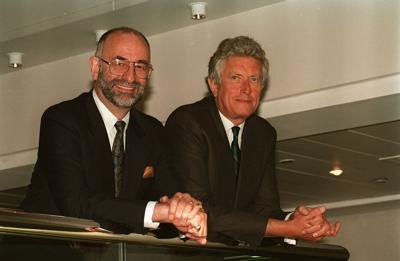The first indication he was about to become a knight arrived in a brown envelope along with the rest of the mail.
Said the letter from the secretary to the then prime minister, Margaret Thatcher: ÔÇťThe Prime Minister is minded to recommend to the Queen to confer a knighthood upon you. If this were to occur, would you please indicate whetheryou would accept.ÔÇŁ
The first thought of Sir Graham Day, as he became, was not for himself, but what this would mean to his father.
ÔÇťMy father was a classic late Victorian. If the Queen had said to my father, ÔÇśJump in front of the train,ÔÇÖ he wouldnÔÇÖt have paused.ÔÇŁ
The knighthood was bestowed because of Sir GrahamÔÇÖs crucial roles in the 1980s as chairman and chief executive of British Shipbuilders, then Rover Group, when both companies were restructured and privatized.
ÔÇťThe civil servants have a phrase, safe hands. So for me it was recognition that my hands were indeed safe, I didnÔÇÖt drop the ball. Mrs. T. believed I delivered. That was very important to me,ÔÇŁ he said. ÔÇťIÔÇÖm an unabashed admirer of Mrs. T. and IÔÇÖve had all four sides of her sharp tongue, particularly in my early dealings with her. One of her standard intros was, ÔÇśDo you mean to tell me ÔÇŽÔÇÖ and I realized that what she was guarding against, not just from me, was people telling her what they thought she wanted to hear.ÔÇŁ
Once any topic was fully aired, the prime minister would say: ÔÇťThen we are agreed, are we not?ÔÇŁ
Donald S. Macdonald loomed large over the Canadian political landscape, writes Rod McQueen.
Sir Graham came to understand ÔÇťthat was your last kick at the cat.ÔÇŁ
Born in Halifax, Sir Graham began his career as a trial lawyer with Canadian Pacific in Montreal. His first exposure to the U.K. came when he oversaw completion of three vessels CP ordered from a shipyard in Birkenhead, across the Mersey from Liverpool. After the ships were delivered, he was hired to run the shipyard that was by then bankrupt.
ÔÇťNot a lot of people want this job,ÔÇŁ he was told. ÔÇťIf you make a hash of it, itÔÇÖs always easier to shoot the colonial than it is to shoot the natives.ÔÇŁ
He turned the shipyard around within a year and returned to law in Canada in 1976. In 1983 he was again summoned to Britain to help with ThatcherÔÇÖs privatization plans.
ÔÇťCanada has always been very slow on privatization. As a nation with a lot of state involvement, Canada has always been well behind the curve.ÔÇŁ
He blamed foot-dragging in the public service, asking, ÔÇťDo turkeys vote for an early Christmas?ÔÇŁ
ÔÇťWhat interests me is trying to change something. Communications is very important and that changes the culture. You want people to be willing participants, not compelled performers.ÔÇŁ
Sir Graham received his knighthood in 1989, before the capability for a Canadian to be honoured was ended. Sir Graham then served as chairman of British Aerospace, Cadbury Schweppes and PowerGen.
He retired at 60 in 1993 and returned to Canada to live in Hantsport, N.S., with a home overlooking the Avon River flowing into the Minas Basin then to the Bay of Fundy.
But he failed at retirement because he was just a 55-minute drive to the Halifax Airport for flights to ╔ź╔ź└▓ where he served on the boards of the Bank of Nova Scotia, Extendicare Inc., and others. He was also chairman of Hydro One Inc.
ÔÇťI was determined to wear out rather than rust out,ÔÇŁ he told me in 2001. ÔÇťRetirement for me was a cessation of working where I had executive responsibilities. In the U.K. if IÔÇÖd dropped dead, it would have been very inconvenient. Now I donÔÇÖt think thereÔÇÖs anything IÔÇÖm doing that would have anything like the magnitude of corporate inconvenience. ThatÔÇÖs the distinction.ÔÇŁ
Sir Graham, who died at 92 this past July, was among a small cadre of Canadian businessmen who moved to the U.K. to become an executive or proprietor. Others include Sir James Dunn, Max Aitken, Roy Thomson and Conrad Black.
Employees feared change, but Karen Maidment was a missionary, Rod McQueen writes.
ÔÇťA lot of Aussies, New Zealanders, South Africans and Irish go to work in the U.K. but very few Canadians,ÔÇŁ he said. ÔÇťA lot of Canadians have managed in a context that is constrained by the borders of Canada ÔÇö or maybe into the U.S. In the U.K., itÔÇÖs hard not to be international.ÔÇŁ
Sir GrahamÔÇÖs knighthood generated a mixed response in Canada all the way from displeasure to one proud mother who pointed out his house to her young son, saying, ÔÇťA knight lives in that house.ÔÇŁ
“Oh,ÔÇŁ said the boy, ÔÇťwhere does he keep his horse?ÔÇŁ
ÔÇťThat, to me, says it all,ÔÇŁ said Sir Graham. ÔÇťItÔÇÖs important to keep yourself in perspective. DonÔÇÖt put on any pretences.ÔÇŁ
Just make sure the suit of armour doesnÔÇÖt get rusty.






























To join the conversation set a first and last name in your user profile.
Sign in or register for free to join the Conversation